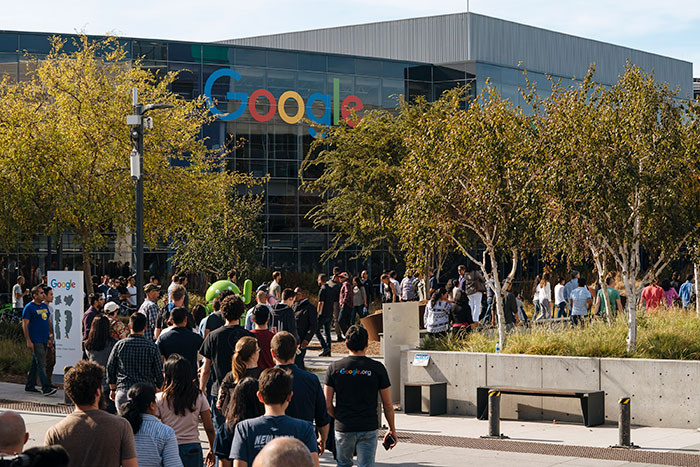How staff came to question Google culture


Roula Khalaf, Editor of the FT, selects her favourite stories in this weekly newsletter.
Google’s weekly all-hands meeting, dubbed TGIF (“Thank God it’s Friday”), is emblematic of Silicon Valley’s culture of open internal communications and employee empowerment.
From the company’s earliest days, workers could ask now-outgoing founders Larry Page and Sergey Brin anything that was on their minds. The famous corporate perks, such as free launderettes and food, may have grabbed the most attention, but the real workplace innovation was in how Google made its workers feel like their views mattered and that they were central to achieving the company’s ambitious goals.
Where the tech industry led, other companies, fighting for top talent, have tended to follow. Many employers had long paid lip service to the idea that their workers were their most important asset. These days, they have to do more than just talk about it.
Fridays are no longer what they were at Google, however, as the company wrestles with how to limit worker unrest. In November last year, the TGIF meetings — a potent symbol inside the company — were changed to a monthly schedule and, most importantly, workers were told to limit their questions to “product and business strategy”.
The freedom given to workers has turned into a liability as tension between management and staff has grown. The tools used to generate cross-company collaboration have become instruments of unrest in the hands of workers opposed to some of the company’s more controversial projects, such as its artificial intelligence work for the US military and a study of whether to launch a censored search engine in China.
Silicon Valley showed the world a new way to work. Now, its leading companies are exposing the limits of the empowerment revolution. As one former Googler says, many workers thought they were “signing up for a movement” when they joined the company. Other organisations might pay lip service to “changing the world”, but Googlers were encouraged to take that ideal literally.

Openness was built into the company’s systems as well as its culture. Employees have long had free rein to view internal documents, for instance, with only informal rules limiting what types of information they could access. Collaboration tools also enabled them to share their views and concerns widely.
But after facing rising employee activism, Google fired four workers in November, claiming that they had abused the company’s open culture to access information and spy on colleagues.
The unfolding case has laid bare a new twist: the software previously used by workers to express themselves and organise in opposition to management has also empowered management to limit what workers are able to do.
Google argued, for instance, that one of the employees who was fired had set up automated alerts on other workers’ calendars to track their activities. The information was allegedly used to help activists organise opposition to particular projects. Software that was meant to foster collaboration, according to Google, was being used against the company.
Workers, in turn, accused the company of spying on them by developing a browser extension that would track when people set up large numbers of automated calendar alerts.
Google called this “categorically false” and said the new browser software was only intended to alert workers to the risk of setting up too many alerts.
Another area where Google has tightened its internal rules concerns worker access to information. Employees were warned last year that anyone who looked at information categorised as “need to know”, without having a good reason to do so, could be fired. The workers who were sacked in November, the company said, had committed “intentional and often repeated violations of our longstanding data security policies, including systematically accessing and disseminating other employees’ materials and work”.
That is not how some employees saw it. “Without the ability to access docs, many of us would be unable to change teams, call attention to ethical concerns . . . or share in the massive job of maintaining the data of billions of users,” says one Googler who protested in support of the four employees. “This transparency is critical to our work, ourselves, and our users.”
Google is not like any other company. Its internal problems are, in no small way, of its own making. It encouraged radical worker empowerment, and is now dealing with the consequences.
But the software and culture that Google is grappling with has spread far beyond Silicon Valley. This makes its attempt to refashion how its workers relate to the company, and to each other, an important test case for future workplaces.
The question now is whether the internet company can steer employee behaviour in ways it considers more constructive, without undermining its culture. How it does so will be a lesson in the limits that workers are likely to see in future on their ability to exercise personal preferences at work.
Debate crackdown riles staff restive about company’s direction
How free should employees be to argue openly with each other over matters they care passionately about — even when those views have no direct bearing on their work?
That is one aspect of the question being put to the test inside Google, as the internet company wrestles with how to tame internal communication channels that have turned into a free-for-all.
Google once encouraged its workers to “bring your whole selves to work”, rather than create a narrow workplace persona. But in recent months, it has changed tack, urging them to focus on the work.
Last summer, the company issued a new set of “community guidelines” on how workers should behave on internal communication channels. Among them: “Don’t troll, name call, or engage in ad hominem attacks.”
It went on: “While sharing information and ideas with colleagues helps build community, disrupting the workday to have a raging debate over politics or the latest news story does not. Our primary responsibility is to do the work we’ve each been hired to do, not to spend working time on debates about non-work topics.”
Instructions such as those may sound like a simple plea for civility. But to disgruntled workers, they have been seen as a cover for cracking down on important internal debate, making it easier for managers to dismiss criticism as a form of harassment.
The result, staff representatives say, has been “limiting criticism of execs” — they argue that the company can use the policy to crack down on anything it does not like by claiming it is uncivil, while “doing nothing” when it comes to attacks on rank-and-file workers.
Comments